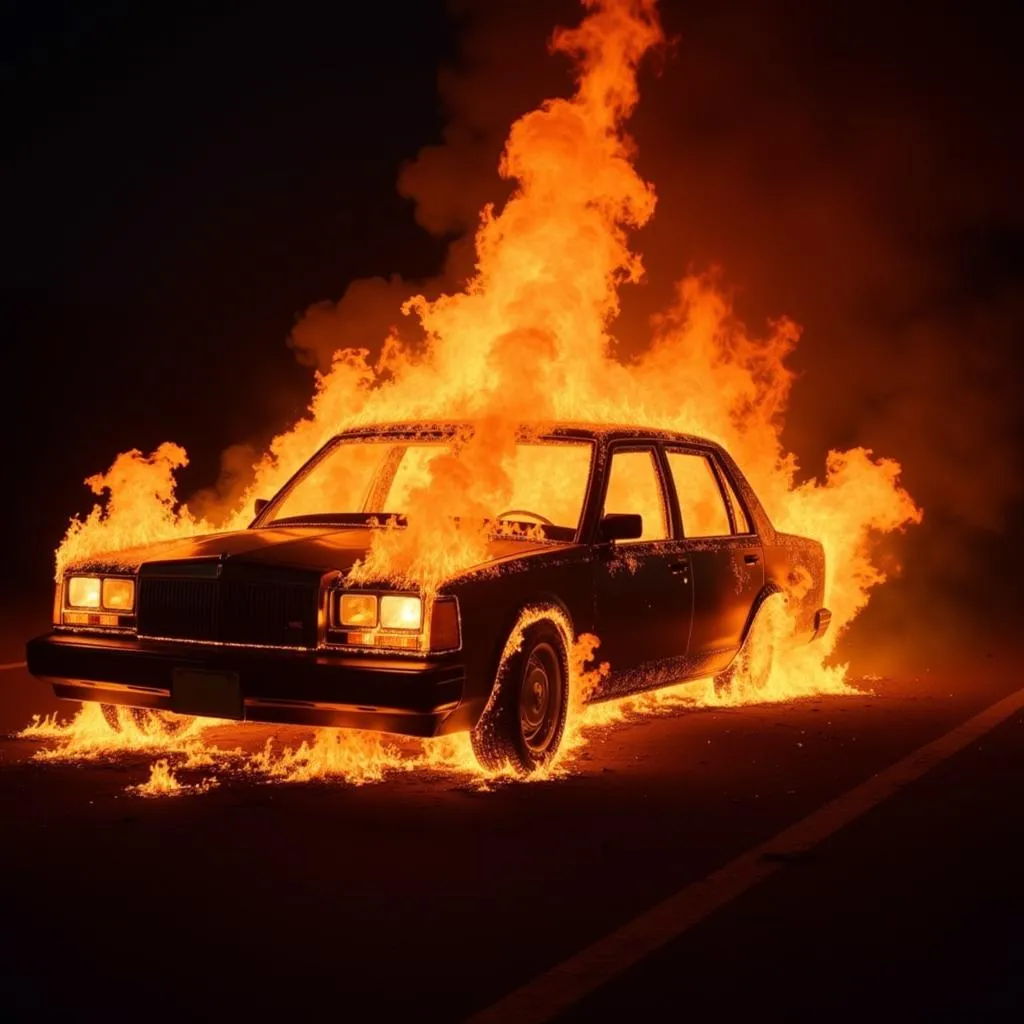A car fire is a traumatic experience, and dealing with the aftermath can be overwhelming. One of the first questions on your mind after ensuring everyone is safe is likely, “Will insurance cover this?” The answer, like many things insurance-related, is: it depends. This article will guide you through the intricacies of car fire insurance claims, explaining what your policy typically covers, factors that might lead to claim denial, and the steps to take to maximize your chances of receiving fair compensation.
When Does Car Insurance Cover Fire Damage?
Most car insurance policies include comprehensive coverage, which typically covers damage caused by fire. This means whether the fire was due to an accident, arson, mechanical failure, or even an act of nature, your insurance should help cover the costs. However, it’s crucial to remember that coverage specifics can vary greatly depending on your insurer and the policy you chose.
What’s Typically Covered Under Comprehensive Coverage?
Comprehensive coverage usually extends beyond just the vehicle itself. Here’s what else it might cover:
- Vehicle Repair or Replacement: If your car is repairable, insurance will typically cover the repair costs. If it’s deemed a total loss, they’ll reimburse you for the vehicle’s actual cash value (ACV), which factors in depreciation.
- Personal Belongings Inside the Car: Coverage for damaged personal items inside your car is often included, but there may be limits. It’s a good idea to keep an inventory of valuable items kept in your vehicle.
- Rental Car Reimbursement: While your car is being repaired or replaced, your policy might cover the cost of a rental car.
 Car on fire
Car on fire
What Could Cause My Claim to Be Denied?
While insurance often covers car fires, some situations could lead to a claim denial:
- Intentional Acts: If the fire was a result of your own intentional act (like arson), your claim will be denied.
- Negligence: Significant negligence on your part that contributed to the fire, such as driving a car you knew had faulty wiring, could lead to a partial or full denial.
- Fraudulent Claims: Any attempt to exaggerate the damage or misrepresent the circumstances of the fire will result in denial and potential legal consequences.
- Lapsed Coverage: If your insurance policy had lapsed at the time of the fire, you would not be covered.
Steps to Take After a Car Fire
Knowing the right steps to take can protect your safety and increase the likelihood of a smooth claims process:
- Ensure Safety First: Your priority is the safety of yourself and any passengers. Evacuate the vehicle immediately and move a safe distance away from the burning car.
- Contact Emergency Services: Call 911 or your local emergency number as soon as possible.
- Document the Incident: If it’s safe, take photos and videos of the fire and the surrounding area. This documentation can be invaluable for your claim.
- Notify Your Insurance Company: Report the incident to your insurance company as soon as possible. Provide them with all the necessary details, including the date, time, location, and cause of the fire (if known).
- Cooperate with the Investigation: Your insurance company will likely conduct an investigation to determine the cause of the fire. Be honest and cooperative throughout the process.
- Keep Detailed Records: Maintain all communication with your insurance company, including claim numbers, dates of conversations, and names of representatives. Keep receipts for any expenses related to the fire, such as towing, rental cars, and medical bills.
 Person talking on phone, insurance paperwork visible
Person talking on phone, insurance paperwork visible
Understanding Your Policy is Key
While the information above provides a general overview, it’s essential to carefully review your specific insurance policy to understand its exact terms and conditions. Pay attention to the definitions of covered perils, exclusions, limitations, and your responsibilities in the event of a claim.
Finding Affordable Car Insurance After a Fire
Experiencing a car fire can unfortunately lead to increased insurance premiums. Here are some tips for finding affordable coverage:
- Shop Around: Get quotes from multiple insurance companies to compare rates and coverage options.
- Ask About Discounts: Inquire about potential discounts, such as good driver discounts, safety feature discounts, or multi-policy discounts.
- Consider a Higher Deductible: Opting for a higher deductible can lower your monthly premium but remember that you’ll have to pay more out of pocket if you need to file a claim.
Navigating Salvage Titles After a Fire
If your car is declared a total loss after a fire, it will likely receive a salvage title. A salvage title means the vehicle has been damaged to the extent that it’s not considered roadworthy. You might be wondering, “Can I still sell a salvage title car? The answer is yes, but the process can be complex. Make sure to check your state regulations on selling salvaged vehicles.
When in Doubt, Consult a Professional
Navigating the aftermath of a car fire and the intricacies of insurance claims can be daunting. If you have questions or need assistance, don’t hesitate to consult with an experienced insurance professional or attorney. They can provide personalized guidance and protect your rights throughout the process.
Will Insurance Cover a Car Fire Started by Another Vehicle?
Let’s say your car catches fire, but the source of the fire originated from another vehicle. Will your insurance still cover the damages?
In most cases, yes, your comprehensive coverage will still apply even if another vehicle caused the fire. However, your insurance company might then subrogate, meaning they will seek reimbursement from the at-fault driver’s insurance company.
What If the Fire Was Due to a Manufacturing Defect?
If investigations reveal the fire resulted from a manufacturing defect in your vehicle, your claim process might involve the vehicle manufacturer directly. You could have grounds for a claim against the manufacturer under product liability law.
Protecting Your Peace of Mind
Remember, knowledge is power when it comes to insurance. Thoroughly understanding your car insurance policy, including comprehensive coverage, is crucial for your peace of mind. If a car fire does occur, act quickly, prioritize safety, document everything, and be prepared to advocate for your rights.
